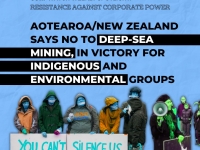Aotearoa/New Zealand Says No to Deep Sea Mining, in Victory For Indigenous and Environmental Groups

Resistance: Aotearoa Deep-Sea Mining
New Zealand’s Supreme Court rejected a giant seabed mining proposal in the South Taranaki Bight, proposed by Trans-Tasman Resources (TTR), in September 2021, following a seven-year-long legal fight by Māori tribes, fisheries and environmental groups. The South Taranaki Bight is home to a recently discovered pygmy blue whale population, critically endangered Māui dolphins and the world’s smallest penguin, the Kororā.
"What's really great is there's a better understanding of Indigenous rights and tangata whenua (people of the land) rights than when we started eight or nine years ago ... there's a different pressure." – Debbie Ngarewa-Packer, Māori Party co-leader
Deep-sea mining
Seabed mining is an experimental industry that involves sending huge machines deep beneath the surface of the water to bulldoze the seabed and extract metals and minerals. Scientists warn that deep-sea mining pollutes wildlife, destroys the homes of ancient coral reefs, sharks, and other sea creatures, and ultimately results in their extinction. It also destroys the deep sea, which is an incredibly important ally against climate change due to its storage of “blue carbon”.
“The ocean is under immense stress from human activity and its function as a carbon sink keeps our planet habitable. To place the ocean under the additional stresses that would be created by deep sea mining would be rolling the dice with the functioning of key planet-wide processes.” - Pippa Howard, Director at Fauna & Flora International
Court decision
The court held weeks of hearings and reviewed submissions by Māori tribes, independent scientists, environmental NGOS and local groups as well as from the fishing industry, before ultimately rejecting the application. This is the third seabed mining application in Aotearoa since 2013 - all of which have been rejected so far on the basis that they violate national law.
"This is the first time that kaitiakitanga (guardianship) and tikanga (Māori customary practices or behaviours) have been tested at this level of law and this will be a game changer for recognition of iwi (Māori tribes) interests and decisions about the environment." – Mike Neho, Tumu whakarae (chairman) of Te Kāhui o Rauru
Global precedent
New Zealand’s rejection of deep-sea mining sets an international precedent and comes amidst a global push by governments and the industry to explore seabed mining more closely. A growing number of countries, NGOs and civil society groups are calling for a ban on deep-sea mining, while over 600 scientists from 44 countries have called for a preliminary pause on the experimental industry.
This is #19 in our series of Instagram infographics on resistance against corporate power.
Click here to see the full post on Instagram.



